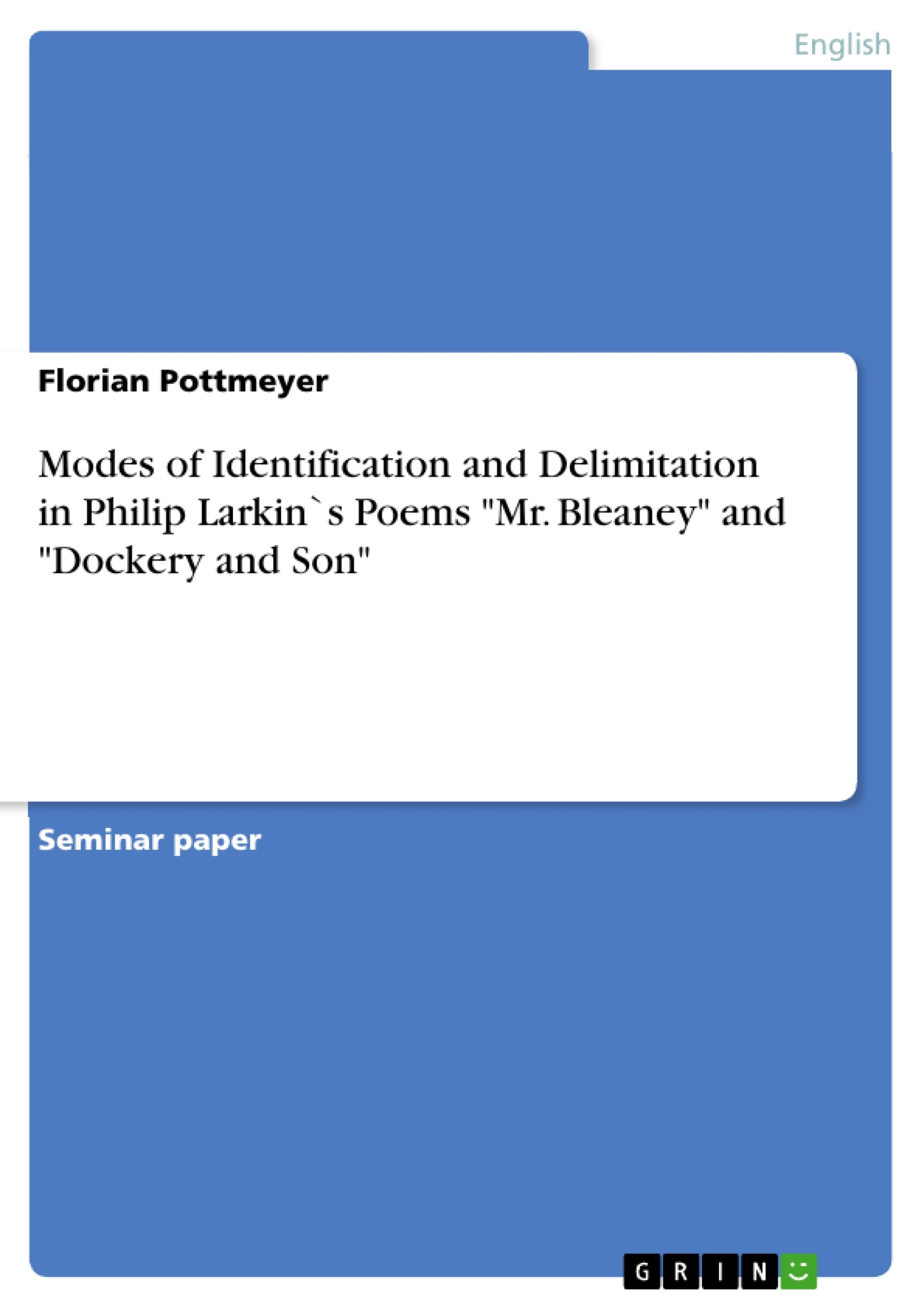Like many of Philip Larkin`s poems, Mr. Bleaney and Dockery and Son present a rather depressing view of life and its meaning. By means of comparing themselves to other characters, the poems` respective speakers willingly or unwillingly tell us something about their own lives. Both poems deal with such opposing themes as solitude and sociability, choice and fate.
The paper at hand will try to present similarities and differences between the two poems. Special emphasis will be put on the reasons for the speakers` identification with Mr. Bleaney and Dockery. Accordingly, the first step will be to give a sketch of the poems` content and communicative situation. After an introduction to the two poems, the way different essential themes are presented in the poems will be compared.
Table of Contents
- Introduction
- A short analysis of the two respective poems
- Modes of Identification in Mr. Bleaney
- Modes of Identification in Dockery and Son
- Comparison
- Solitude and Sociability
- Choice and Fate
- Conclusion
Objectives and Key Themes
This paper compares and contrasts two poems by Philip Larkin, "Mr. Bleaney" and "Dockery and Son," examining the ways in which the speakers' identification with other characters reveals insights into their own lives. The paper specifically focuses on the reasons for the speakers' identification with Mr. Bleaney and Dockery.
- Modes of identification in poetry
- Themes of solitude and sociability
- The role of choice and fate in shaping lives
- The impact of the speakers' past on their present experiences
- Contrasting perspectives on life and meaning
Chapter Summaries
The introduction establishes the main focus of the paper, which is to compare and contrast the ways in which the speakers in "Mr. Bleaney" and "Dockery and Son" identify with other characters. The paper outlines the key themes and aims to provide a detailed analysis of the poems.
The first chapter presents an analysis of the modes of identification in "Mr. Bleaney." The speaker's initial perception of Mr. Bleaney is shaped by the landlady's description, leading to a contrasting view of Bleaney's life and personality. Through the speaker's description of the room and his imagined thoughts about Bleaney, the reader is presented with a sense of disillusionment and resignation. The chapter also explores the ways in which the speaker unconsciously identifies with Bleaney, highlighting the interplay of perception, memory, and self-reflection.
The second chapter focuses on the modes of identification in "Dockery and Son." The speaker, reflecting on his past and his present state as an aging bachelor, contemplates the choices made by Dockery, a former fellow student. This contemplation leads the speaker to question the significance of choices and the impact of circumstance in shaping one's life. The chapter examines how the speaker's perspective is influenced by his own experiences of isolation and lack of a family.
Keywords
The key terms and concepts explored in this paper include: modes of identification, Philip Larkin, "Mr. Bleaney," "Dockery and Son," solitude, sociability, choice, fate, perception, memory, self-reflection, disillusionment, resignation, isolation, and contrasting perspectives on life and meaning.
Frequently Asked Questions
Which poems by Philip Larkin are analyzed in this paper?
The paper analyzes and compares "Mr. Bleaney" and "Dockery and Son."
What are the central themes of these poems?
The poems deal with themes of solitude vs. sociability, choice vs. fate, and the meaning of life.
How does the speaker in "Mr. Bleaney" identify with the title character?
The speaker identifies with Mr. Bleaney through the shared experience of a sparse, rented room and a sense of disillusionment.
What contrast is presented in "Dockery and Son"?
It contrasts the life of the speaker, an aging bachelor, with that of his former fellow student Dockery, who has a family.
What view of life does Larkin typically present in these works?
Larkin presents a rather depressing and resigned view of life and its ultimate meaning.
- Quote paper
- Florian Pottmeyer (Author), 2000, Modes of Identification and Delimitation in Philip Larkin`s Poems "Mr. Bleaney" and "Dockery and Son", Munich, GRIN Verlag, https://www.grin.com/document/32380



